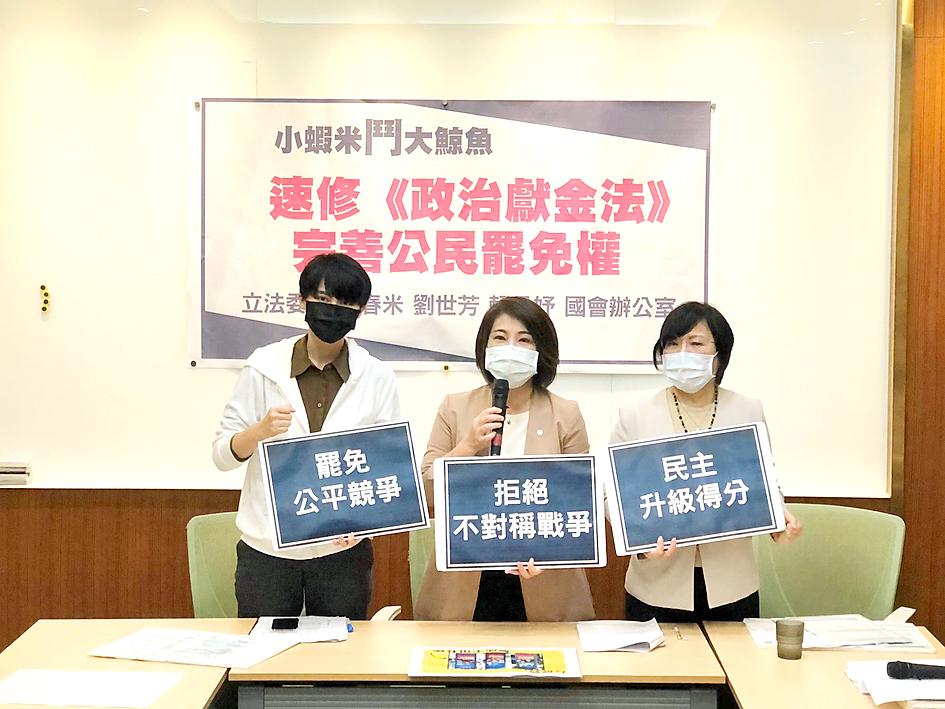The Democratic Progressive Party (DPP) yesterday proposed an amendment to the Political Donations Act (政治獻金法) to allow those launching recall-related events to receive political donations, saying that the current regulations infringe on people’s right to recall officials.
The draft amendment says that groups launching a recall of officials and those being recalled should both be able to receive political donations, but the groups initiating the process would have to pass the first stage of collecting signatures before they can ask for donations.
The funds could not be used for other purposes and all donations to either side would have to be turned over to the government once the efforts to launch a recall, or a recall vote, have concluded, it says.

Photo courtesy of Chou Chun-mi’s office
Article 17 of the Constitution says that the rights of election and recall are important factors for public participation in politics, said DPP Legislator Chou Chun-mi (周春米), one of the sponsors of the bill.
However, the act currently only designates political parties and groups, as well as candidates, eligible recipients of political donations, and fails to address by-elections resulting from a successful recall, Chou said, adding that the oversights go against the nation’s democratic system.
DPP Legislator Liu Shih-fang (劉世芳) said that a recall vote launched against Kaohsiung Mayor Han Kuo-yu (韓國瑜) has highlighted the inadequacies of the current system.
The Wecare Kaohsiung coalition of civic groups gathered sufficient signatures to launch the recall vote against Han, which was approved by the Central Election Commission and is to be held on Saturday next week.
Civic groups are comprised of regular citizens and would face difficulty standing up to the concerted actions of a government, such as those of Han and the Kaohsiung City Government, Liu said.
DPP Legislator Lai Pin-yu (賴品妤) cited documents previously released by Wecare Kaohsiung showing that it had spent NT$8 million (US$266,773) staging rallies.
Han is the only public figure in Taiwan to be the target of two recalls, following one in 1994 when he was a legislator, Lai said.
Han and the Kaohsiung City Government’s actions highlight the urgent need to amend relevant legislation and systems, she added.

Several Chinese Nationalist Party (KMT) officials including Chairman Eric Chu (朱立倫) are to be summoned for questioning and then transferred to prosecutors for holding an illegal assembly in Taipei last night, the Taipei Police said today. Chu and two others hosted an illegal assembly and are to be requested to explain their actions, the Taipei City Police Department's Zhongzheng (中正) First Precinct said, referring to a protest held after Huang Lu Chin-ju (黃呂錦茹), KMT Taipei's chapter director, and several other KMT staffers were questioned for alleged signature forgery in recall petitions against Democratic Progressive Party (DPP) legislators. Taipei prosecutors had filed

Taiwan would welcome the return of Honduras as a diplomatic ally if its next president decides to make such a move, Minister of Foreign Affairs Lin Chia-lung (林佳龍) said yesterday. “Of course, we would welcome Honduras if they want to restore diplomatic ties with Taiwan after their elections,” Lin said at a meeting of the legislature’s Foreign Affairs and National Defense Committee, when asked to comment on statements made by two of the three Honduran presidential candidates during the presidential campaign in the Central American country. Taiwan is paying close attention to the region as a whole in the wake of a

NEW WORLD: Taiwan is pursuing innovative approaches to international relations through economics, trade and values-based diplomacy, the foreign minister said Taiwan would implement a “three-chain strategy” that promotes democratic values in response to US tariffs, Minister of Foreign Affairs Lin Chia-lung (林佳龍) said. Taiwan would aim to create a “global democratic value chain,” seek to capitalize on its position within the first island chain and promote a “non-red supply chain,” Lin was quoted as saying in the ministry’s written report to the Legislative Yuan submitted ahead of the legislature’s Foreign Affairs and National Defense Committee meeting slated for today. The Ministry would also uphold a spirit of mutual beneficial collaboration, maintaining close communication and consultations with Washington to show that Taiwan-US cooperation

Taiwan and the US have begun trade negotiations over tariffs imposed by US President Donald Trump earlier this month, Minister of Foreign Affairs Lin Chia-lung (林佳龍) said in an interview this morning before reporting to the Legislative Yuan’s Foreign Affairs and National Defense Committee. The Taipei Economic and Cultural Representative Office (TECRO), Taiwan’s de facto embassy in the US, has already established communication channels with the US Department of State and the US Trade Representative (USTR), and is engaging in intensive consultations, he said. Points of negotiation include tariffs, non-tariff trade barriers and issues related to investment, procurement and export controls, he